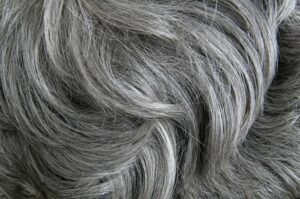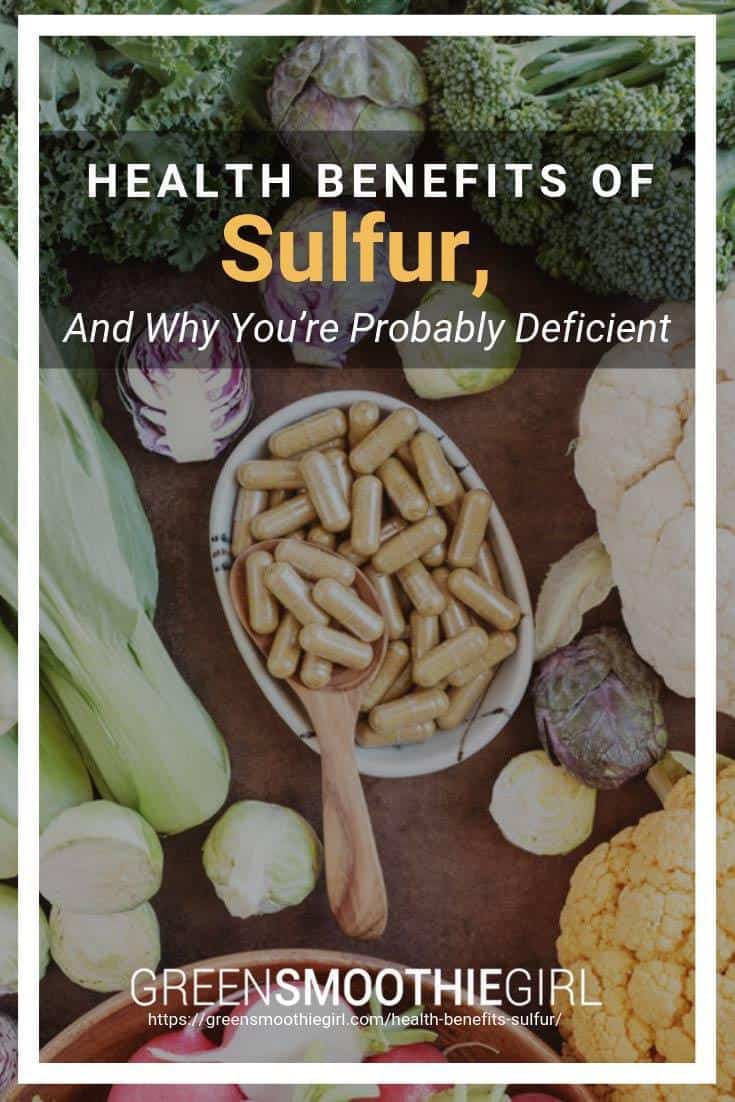Health Benefits of Sulfur (and Why You’re Probably Deficient)

What do Iceland, Italy, Finland, and Greece have in common?
Just some of the lowest rates of obesity, heart disease, depression, inflammatory diseases, and autoimmune diseases in the entire world.¹ Not to mention, some of the oldest and healthiest people on the planet.
But what happens when you take those Icelanders, Italians, Finlandians, and Grecians and transplant them to the United States or Canada? Those health benefits — even if the same diet is maintained — begin to disappear.
Why? In part, because countries like Italy, Greece, Finland, and Iceland are extremely rich in sulfur, the so-called “miracle mineral.”
And while it’s true that most people in the United States are severely deficient in sulfur,² you don’t need to pack your bags for Europe quite yet. You can fix the problem without going anywhere.
Keep reading to learn more about the incredible health benefits of sulfur, symptoms of sulfur deficiency, foods that are high in sulfur, and whether or not you should supplement with organic sulfur, or MSM (methylsulfonylmethane).
In this article:
- What is Sulfur, and Why is it Important?
- Uses and Health Benefits of Organic Sulfur
- Symptoms of Sulfur Deficiency
- Foods with High Sulfur Content
- Should You Supplement with Organic Sulfur?
- Conclusions About Organic Sulfur
What Is Sulfur, and Why Is It Important?
Sulfur is an essential mineral that our bodies require to function properly.

The health benefits of sulfur are key to making sure your body's systems run smoothly
But before you wrinkle your nose as you imagine a yellowish, foul-smelling substance, you should know that there are two main types of sulfur:
Sulfur oxide is that stereotypical, smelly, yellowish chemical element that belches out of volcanoes and is often used in manufacturing as sulfur oxide to refine petroleum. Not only can your body not use it, but it’s toxic and even fatal in high doses.
Organic sulfur, on the other hand, is white in color, completely odorless, and non-toxic. This naturally-occurring sulfur compound is used by all living things to transfer oxygen from the air you breathe and the water you drink, into your cells. It’s also critical to making glutathione, an antioxidant our bodies make to protect us from free radicals. The technical name for this organic compound is methylsulfonylmethane, or MSM for short.
So, where does organic sulfur or MSM come from? The foods we eat (like broccoli, arugula, and garlic). The human body can’t produce sulfur on its own, so our cellular health depends on consuming enough organic sulfur each day.
Unfortunately, crops in the US (and many countries abroad) have been sulfur-deficient since 1954, thanks to mandated use of chemical pesticides in agriculture. Pesticides, fertilizers, and massive crop yields strip the soil of minerals and make it more difficult for plants to draw sulfur out of the ground.
Since the chemical fertilizer boom in 1954, disease rates in the United States have risen by about 4,000%. Finland, on the other hand, outlawed chemical pesticides and fertilizers in 1985 — and saw its disease rates drop by 90%.³

The ground our food grows in has to be well-balanced and pesticide-free for us to enjoy the health benefits of sulfur
Uses and Health Benefits of Organic Sulfur (MSM)
The health benefits of organic sulfur/MSM are inextricably linked with the health benefits of getting enough oxygen. Not air, mind you. Oxygen.
You might be breathing air just fine, but whether or not the 20% oxygen in that air (or the 90% oxygen in water, for that matter) makes its way to your cells is a totally separate matter.
Organic sulfur grabs up oxygen from water and air, then ports it across your cell membranes so it can be used to produce energy and flush toxins. Unlike other vital minerals, your body can’t store organic sulfur. But guess what can? Plants (unless, of course, those plants have been treated with fertilizers and chemicals; more on that below).
Our bodies use sulfur to produce glutathione, a powerful antioxidant that scavenges for free radicals (e.g.,dangerous chemicals we breathe, eat, or absorb) that pose a threat to our cellular health and can cause cancer and disease.
Unsurprisingly, ongoing studies³ show that organic sulfur has a wide variety of uses and health benefits.
Healing Scar Tissue, Stretch Marks, and Fibroids
Organic sulfur helps heal old scar tissue, stretch marks, and fibroids for the same reason it drastically improves the health of your skin. Oxygenated cells are better able to repair damage to cells and multiply and regenerate with healthy cells.
Slowed Aging and Wrinkling
Sulfur is sometimes referred to as “the beauty mineral,” and when you consider that the skin or epidermis is actually an organ made up of millions of cells, that name makes sense! Skin cells that don’t get enough oxygen are dull, susceptible to damage, and more likely to lose their elasticity. Change that dynamic by infusing your skin cells with oxygen, and the result is beautiful, healthy, supple skin with fewer wrinkles!
Cancer
Unlike healthy cells, cancer cells don’t need oxygen to function properly. Infusing healthy cells with oxygen can mobilize a more effective immune response while slowing tumor growth and even killing cancer cells. Studies have documented that organic sulfur can fight cancer (including breast cancer,4 bladder cancer,5 and liver cancer6) by reducing tumor size — without the side effects of chemotherapy. Organic sulfur has also been documented to help the body scavenge for free radicals and lower oxidative stress7 through better glutathione production.
Acne, Rosacea, Psoriasis, and Liver Spots
Cells that are infused with oxygen are healthy cells. The inflammation and accumulation of waste, toxins, and damaged cells that create skin conditions like acne, rosacea, psoriasis, and liver spots can be significantly improved with organic sulfur.8

The health benefits of sulfur include an improved complexion.
Heart Health
An ongoing, large-scale study of organic sulfur3 showed that sulfur can have incredible benefits for cardiovascular health. The study documented 54 patients with scheduled open-heart surgery who canceled those procedures when their EKGs displayed healthy results after only 6 weeks. How? Organic sulfur helps blood cells repair and regenerate, breaks down plaque deposits, and eliminates scar tissue.
Irritable Bowel Syndrome, GERD, and Leaky Gut Syndrome
Organic sulfur can help with a number of digestive problems.9 Sulfur helps the cells in the gut lining regenerate quickly, which puts a stop to food particles “leaking” out into the bloodstream, triggering an immune response and inflammation. Sulfur also reduces inflammation and swelling in the intestines and esophagus, soothing GERD and IBS. While there aren’t yet any studies to document sulfur’s benefits for Crohn’s disease or ulcerative colitis, there’s a great deal of anecdotal evidence!
Hemorrhoids
Organic sulfur has been clinically proven to significantly improve pain, bleeding, and swelling from hemorrhoids,10 especially when taken with tea tree oil.
Alzheimer’s Disease
Sulfur shows incredible promise for treating Alzheimer’s disease, in part because it blocks the absorption of aluminum. Dr. Ronald Roth has shown11 that patients with early Alzheimer’s disease are very deficient in sulfur, while patients with later stages of the disease are almost completely deficient. One recent report11 reads: “While some drugs or antibiotics may slow, or if it should happen halt the progression of Alzheimer's disease, sulfur supplementation has the potential of not only preventing, but actually reversing the condition, provided it has not progressed to a stage where much damage has been done to the brain.”
Arthritis and Osteoarthritis
Clinical trials show a great deal of promise for inflammatory joint disorders. One 12-week trial12 showed that, compared with placebo, organic sulfur was effective in bringing down pain and swelling, while improving range of motion. Organic sulfur helps cells get back to functioning normally, which means more collagen, less inflammation, and less painful fluid buildup.
Hair Loss, Depigmentation, and Breakage
Organic sulfur is one of the best ways to make your hair stronger, thicker, shinier, and more vibrant in color (you may be able to say goodbye to gray hair!). And if you suffer from alopecia or hair loss, sulfur can be the key to reversing the condition. Sulfur helps struggling, unhealthy cells start producing keratin, collagen, and pigment, three things that are absolutely vital to healthy hair.

A healthy amount of sulfur in your body can preserve your hair's pigment as you age.
Oral Health
Organic sulfur can make a big difference in your oral health. By taking an organic sulfur supplement and adding sulfur to your toothpaste or powder, you can cut down on the buildup of plaque and prevent gingivitis, halitosis, and oral cancers as cells in the mouth regenerate and flush out toxins.
Respiratory Disorders
Respiratory disorders like asthma and allergies happen when the airways become constricted and inflamed. Organic sulfur helps lower that inflammation, reduces fluid retention, and stops swelling in the airways and lungs.
Metabolic Disorders, Obesity, Diabetes, Hyperglycemia, and Insulin Resistance
Cells that have access to enough oxygen are cells that can make the right amount of insulin. Studies show that organic sulfur improves metabolic disorders leading to obesity13 by regulating insulin production, as well as helping cells break down and use sugar and carbohydrates more effectively.
Osteoporosis
Bone loss and brittleness is one of the leading causes of breaks, fractures, and tissue loss, especially in aging women. Organic sulfur helps cells in the blood, bone, and marrow produce and regenerate healthy tissue,14 to avoid bone fragility.
Endometriosis
While organic sulfur has not been officially studied in relation to endometriosis, the anecdotal evidence is strong. Organic sulfur can help women who suffer from endometriosis (scar tissue and inflammation that builds up in the uterus) by lowering inflammation, speeding up production of healthy cells, and flushing out toxins and dead cells.
Muscle Spasms and Pain
Because organic sulfur lowers oxidative stress, it can help muscles recover from injury and stress more quickly.15 Studies show that a mere 10 days of supplementing with organic sulfur16 can make a big difference in muscle repair and pain management.
Mood Disorders
Organic sulfur is incredibly beneficial for mood disorders like depression, PMS, ADHD, ADD, and seasonal affective disorder. Sulfur helps stabilize mood by improving gut health (where the majority of serotonin and dopamine are produced!17) and by helping the body produce glutathione18 (a powerful antioxidant that’s critical to mental stability) more readily. One ongoing study of organic sulfur3 showed that many participants were able to stop taking Ritalin or antidepressants within days of supplementing with organic sulfur.
Hepatitis and Liver Problems
As the only organ in the body capable of fully regenerating itself, the liver can be completely transformed with organic sulfur. As healthy, oxygenated cells regenerate and replace damaged cells, while lowering oxidative stress, the liver can begin functioning properly again.
Glaucoma
An ongoing, large-scale study of organic sulfur3 is showing promise for glaucoma sufferers. Results indicate that sulfur reduces swelling and pressure on the inner eye and also helps the eye drain properly. While many medications and drops make it difficult for patients to read or drive, organic sulfur has none of these side effects.
Symptoms of Sulfur Deficiency
After calcium and phosphorus, sulfur is meant to be the most plentiful mineral in the human body, supporting cellular health at every level. However, because of chemical pesticides and fertilizers that break the sulfur cycle in plants, studies show that the majority of us are sulfur deficient.2
A sulfur deficiency can show up as any of the following symptoms:
- General unwellness, fatigue, and depressed mood as the cells in your vital organs struggle to get enough oxygen
- Unhealthy hair (dry, dull or brittle hair, graying hair, or hair loss)
- Skin problems like acne or rosacea
- Premature signs of aging, like wrinkles and sagging
- A wide array of diseases and disorders including liver disease, cancer, endometriosis, Alzheimer’s disease, obesity, heart disease, and autoimmune disorders
Thankfully, sulfur is not only one of the most important deficiencies you can address — it’s also the easiest.

Apricots are one of the foods that give you a boost of organic sulfur.
Foods With High Sulfur Content
Here’s the thing: Sulfur is supposed to be present in many of the foods we eat. Plants use this crucial mineral to make chlorophyll and for photosynthesis.
Unfortunately, unless the sulfur-rich fruits, nuts, and vegetables you eat are 100% organic and unprocessed, you’re very likely deficient in sulfur, thanks to pesticides, fertilizers, depleted soil, and heavy processing.
The following organic fruits, nuts, and vegetables are high in sulfur:
- Cruciferous vegetables like broccoli, asparagus, cabbage, cauliflower, turnips, bok choy, Brussels Sprouts, kohlrabi, and sprouts
- Allium vegetables including garlic, leeks, onions, and chives
- Leafy green vegetables like spinach, arugula, and kale
- Mushrooms
- Nuts, including walnuts, almonds, peanuts, and brazil nuts
- Apricots and peaches
While it’s true that meat, eggs, seafood, and poultry do contain high levels of sulfur, many people (including myself) choose to avoid animal products because of their high levels of endocrine disruptors (like dioxins), which can wreak havoc on your hormone levels and organs.
So, if you can’t eat 100% organic (either because of financial constraints or availability), how can you get enough organic sulfur in your diet? Let’s talk supplementation.
Should You Supplement with Organic Sulfur?
There’s really no way around it: Most of us should be supplementing with organic sulfur. Even if you eat a 100% organic, primarily raw, vegan diet, there’s no guarantee regarding how much sulfur you’re actually getting, as a result of mass-farming practices that deplete the soil.
But taking a sulfur supplement isn’t as simple as driving to your nearest health foods store and snagging a bottle of “organic sulfur” or “organic MSM.”
What Kind of MSM Supplement Is Best?
Choose crystallized MSM (not powdered or tableted pills) for the purest supplement. And just as importantly, make sure it doesn’t contain toxic additives, like anti-caking agents added (they make it more difficult for your body to absorb the sulfur). Look for assurance of “100% natural” and “no fillers.”

Organic sulfur crystals can be a welcome addition to your supplement routine
How Much Organic Sulfur Should I Take?
As with many supplements, the FDA hasn’t established a dietary recommendation for sulfur. Remember, organic sulfur is nontoxic and won’t harm you. Your dosage will depend a lot on your health. Cancer protocols using sulfur as a treatment19 call for a much higher dose, while most naturopaths and functional medicine providers recommend about 3-6 grams per day, split up into 2 or 3 doses.
Is Organic Sulfur Nontoxic?
While the recommended dose is typically about 3-6 grams per day (unless part of a cancer protocol, where the dosage may be doubled), the FDA hasn’t established an upper limit for organic sulfur. While dosage amounts higher than this aren’t necessary and do not show an increase in health benefits, initial studies show that even extremely high levels of 200 grams per day are not toxic for mice or humans.3
How Do I Take Organic Sulfur?
Most people dissolve organic sulfur in a glass of water or juice, and drink it two or three times per day. The crystals can be difficult to dissolve, so you may want to heat your water first!
What Does Organic Sulfur Taste Like?
The answer to this question depends on your taste buds! Organic sulfur is highly alkaline, meaning it can have a bitter taste. Whether or not MSM tastes bitter to you will depend on your taste receptors and how strongly you perceive bitter substances. For some people, MSM is completely tasteless. For others, MSM tastes very bitter and can be difficult to swallow!
I swallow bitters every day before a meal, because it stimulates healthy bile production (super important for liver health, and your liver is central to your overall health), so you can kill two birds with one stone by drinking your MSM in water 15-30 minutes before each meal.
How Can I Mask the Bitter Taste of Organic Sulfur?
If MSM tastes bitter to you, don’t despair. You can try mixing in a little stevia or organic juice to mask the bitter taste with something sweet. Or, alternately, you can purchase empty, vegan capsules to fill with MSM yourself. A more convenient option is to find the crystals already prefilled in capsules.
Can Other Supplements Improve the Effectiveness of MSM?
Essential fatty acids like Omega 3, in sprouted bioavailable form, can help your body use and absorb sulfur more readily. Taking a complete, organic mineral supplement can likewise help your cells make the most use of this vital mineral.
Conclusions about Organic Sulfur (MSM)
If you’ve always associated sulfur with a stinky, toxic yellow gas that’s better off avoided, it’s time to change that association! Colorless, odorless organic sulfur (MSM) is not only completely non-toxic, but it’s vital to your health and wellbeing.
This “miracle mineral” draws oxygen out of the air and water you consume, transporting it across the cell membranes in your skin, bloodstream, and organs to flush out waste and toxins, improve cell function, scavenge for free radicals, and repair damage. The result is beautiful skin and hair, healthier vital organs, and reduced inflammation.
Because of soil depletion and mass use of chemical pesticides, most of us don’t get nearly enough organic sulfur from the plants we eat. By supplementing with MSM, you can enjoy all the health benefits of organic sulfur, ranging from improved acne to avoiding Alzheimer’s.
Read next: What Does Organic Mean? Should I Pay More for It or Not?

Disclosure: This post may contain affiliate links that help support the GSG mission without costing you extra. I recommend only companies and products that I use myself.
Resources
- Alcorn, Chauncey. “Here’s Where America Ranks Among the Healthiest Countries,” Fortune, Sept. 22, 2016.
- Nimni ME, Han B, Cordoba F. Are we getting enough sulfur in our diet? Nutrition & Metabolism. 2007;4:24. doi:10.1186/1743-7075-4-24.
- McGean, Patrick, “Early results of an experimental study using organic sulfur,” NaturoDoc. Accessed Oct. 19, 2018.
- Lim EJ, Hong DY, Park JH, et al. Methylsulfonylmethane Suppresses Breast Cancer Growth by Down-Regulating STAT3 and STAT5b Pathways. Li J, ed. PLoS ONE. 2012;7(4):e33361. doi:10.1371/journal.pone.0033361.
- Joung YH, Na YM, Yoo YB, Darvin P, Sp N, Kang DY, Kim SY, Kim HS, Choi YH, Lee HK, Park KD, Cho BW, Kim HS, Park JH, Yang YM. “Combination of AG490, a Jak2 inhibitor, and methylsulfonylmethane synergistically suppresses bladder tumor growth via the Jak2/STAT3 pathway.” Int J Oncol. 2014 Mar;44(3):883-95. doi: 10.3892/ijo.2014.2250. Epub 2014 Jan 8.
- Kim J-H, Shin H-J, Ha H-L, et al. Methylsulfonylmethane suppresses hepatic tumor development through activation of apoptosis. World Journal of Hepatology. 2014;6(2):98-106. doi:10.4254/wjh.v6.i2.98.
- Yoon Hee Kim, Dae Hwan Kim, Hwan Lim, Doo-Yeon Baek, Hyun-Kyung Shin, Jin-Kyung Kim. “The anti-inflammatory effects of methylsulfonylmethane on lipopolysaccharide-induced inflammatory responses in murine macrophages.” Biol Pharm Bull. 2009 Apr; 32(4): 651–656.
- Enzo Berardesca, Norma Cameli, Claudia Cavallotti, Jean Luc Levy, Gérald E. Piérard, Gianfranco de Paoli Ambrosi. “Combined effects of silymarin and methylsulfonylmethane in the management of rosacea: clinical and instrumental evaluation.” J Cosmet Dermatol. 2008 Mar; 7(1): 8–14. doi: 10.1111/j.1473-2165.2008.00355.x
- Hae-Rim Lee, Sun-Duk Cho, Woon Kyu Lee, Gun-Hee Kim, Soon-Mi Shim. “Digestive recovery of sulfur-methyl-L-methionine and its bioaccessibility in Kimchi cabbages using a simulated in vitro digestion model system.” J Sci Food Agric. 2014 Jan 15; 94(1): 109–112. Published online 2013 May 29. doi: 10.1002/jsfa.6205
- N. Joksimovic, G. Spasovski, V. Joksimovic, V. Andreevski, C. Zuccari, C. F. Omini. “Efficacy and tolerability of hyaluronic acid, tea tree oil and methyl-sulfonyl-methane in a new gel medical device for treatment of haemorrhoids in a double-blind, placebo-controlled clinical trial.” Updates Surg. 2012 Sep; 64(3): 195–201. Published online 2012 Apr 11. doi: 10.1007/s13304-012-0153-4
- “Alzheimer’s Disease: Nutritional Causes, Treatments, and Prevention.” Research on Cellular Nutrition and Trace Mineral Analysis, Accessed Oct. 19, 2018.
- Brien S, Prescott P, Lewith G. Meta-Analysis of the Related Nutritional Supplements Dimethyl Sulfoxide and Methylsulfonylmethane in the Treatment of Osteoarthritis of the Knee. Evidence-based Complementary and Alternative Medicine : eCAM. 2011;2011:528403. doi:10.1093/ecam/nep045.
- Inês Sousa-Lima, Shin-Young Park, Michelle Chung, Hyun Ju Jung, Min-Cheol Kang, Joana M. Gaspar, Ji A. Seo, M. Paula Macedo, Kyong Soo Park, Christos Mantzoros, et al. “Methylsulfonylmethane (MSM), an organosulfur compound, is effective against obesity-induced metabolic disorders in mice.” Metabolism. 2016 Oct; 65(10): 1508–1521. Published online 2016 Jul 20. doi: 10.1016/j.metabol.2016.07.007
- Butawan M, Benjamin RL, Bloomer RJ. Methylsulfonylmethane: Applications and Safety of a Novel Dietary Supplement. Nutrients. 2017;9(3):290. doi:10.3390/nu9030290.
- Withee ED, Tippens KM, Dehen R, Tibbitts D, Hanes D, Zwickey H. Effects of Methylsulfonylmethane (MSM) on exercise-induced oxidative stress, muscle damage, and pain following a half-marathon: a double-blind, randomized, placebo-controlled trial. Journal of the International Society of Sports Nutrition. 2017;14:24. doi:10.1186/s12970-017-0181-z.
- S. Barmaki, S. Bohlooli, F. Khoshkhahesh, B. Nakhostin-Roohi. “Effect of methylsulfonylmethane supplementation on exercise - Induced muscle damage and total antioxidant capacity.” J Sports Med Phys Fitness. 2012 Apr; 52(2): 170–174.
- Hadhazy, Adam. “Think Twice: How the Gut’s ‘Second Brain’ Influences Mood.” Scientific American. February 12, 2010
- Nakhostin-Roohi B, Niknam Z, Vaezi N, Mohammadi S, Bohlooli S. Effect of Single Dose Administration of Methylsulfonylmethane on Oxidative Stress Following Acute Exhaustive Exercise. Iranian Journal of Pharmaceutical Research : IJPR. 2013;12(4):845-853.
- Kerr, Webster. “Organic Sulfur Protocol for Cancer a Stage III Cancer Treatment,” Cancer Tutor, March 6, 2018.
Posted in: Natural Remedies, Supplements















